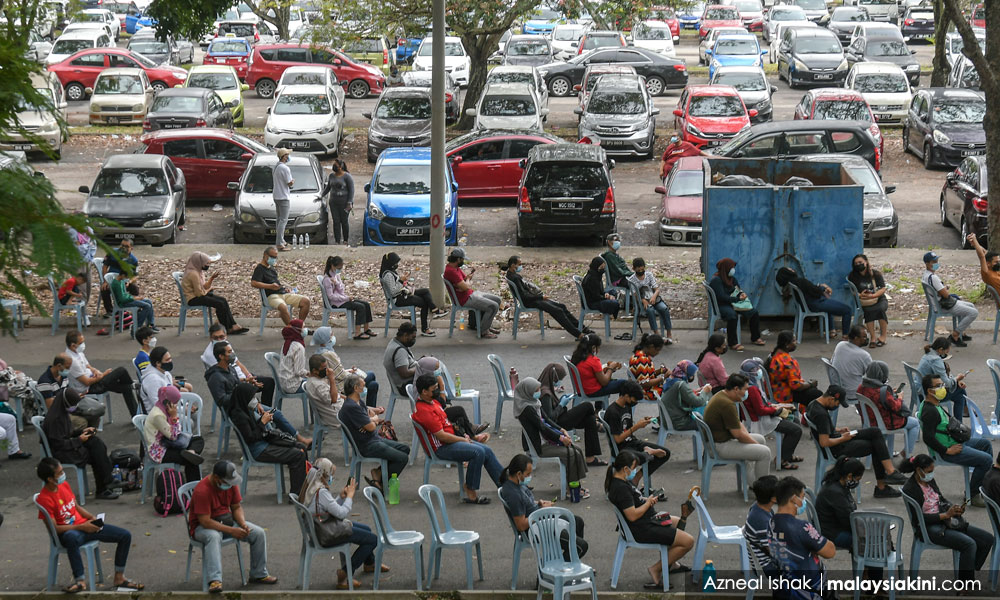LETTER | Malaysia has been struggling with the Covid-19 pandemic for more than a year. Every day the number of Covid-19 cases reported has increased. As of July 15, 2021, we have recorded over 13,215 cases.
This is a clear indication of the government’s failure to curb the pandemic. The growing infections based on recently recorded case figures have had a major impact on other sectors.
Our healthcare system is on the brink of collapse, the economy is in shambles, there are increasing mental stress problems, and education is non-functional.
This situation is creating a ripple effect that will definitely extend to more distant sectors, including its impact on future generations.
Currently, the people are still struggling because of the failure of our country's leadership to control the spread of Covid-19.
The call to close the manufacturing sector to curb the Covid-19 pandemic was criticised by some quarters who want to continue opening up the sector to ensure the economy runs smoothly.
Throughout the pandemic, various parties representing the interests of the public have highlighted the views and methods that can be used to overcome the pandemic.
These views need to be taken into account because they are based on solid facts and evidence.
But there are those who seem to be comfortable living in denial. Some even divert attention by making empty claims that the whole world is in as bad a state as Malaysia.
Such a comparison is absolutely inaccurate. In New Zealand, the total number of cases recorded is low at 2,790 as of July 14, 2021, with an average daily increase of four.
There are differing views on what constitutes strong leadership. Today, there may be simple comparisons with China as well as the United States. Some say the Chinese government has now managed to control the Covid-19 pandemic due to the heavy-handed communist system of government. In contrast, the United States, which puts democracy and human rights principles first, is said to have failed to control the pandemic.

These conclusions are overly simplistic, however. A more critical analysis provides different conclusions. For example, today we are about to enter the eighth month of the emergency period which involved the suspension of Parliament as well as several provisions in the Federal Constitution.
Executive power is interpreted by the attorney-general to include the power to determine the sitting of Parliament at any time. But despite this centralisation of power, the executive or the government still failed to curb the Covid-19 pandemic and has even seen a drastic increase in cases.
Thus, it has been shown that a government that suspends democratic principles is not employing the right vehicle to combat Covid-19. The question now is, how can the country build confidence among the people about the policies and regulations it wants to implement to deal with this pandemic?
In this regard, New Zealand Prime Minister Jacinda Ardern’s leadership can serve as an example. She spoke honestly and openly about the Covid-19 threat. Policy implementation was based on science and data with good communication with the people.
The New Zealand government was also open to all parties as part of the implementation of a check-and-balance mechanism as well as a comprehensive and thorough policy-making process.
This action has resulted in the success of the government under Ardern to empower the people to fulfil their shared responsibility to curb the Covid-19 epidemic.
Shlomo Ben-Ami's article 'Why democracies are better at managing crises' (Australian Strategic Policy Institute) is interesting to read, as he emphasises that most of the countries that have been more successful in fighting Covid-19 are countries that put democracy first.

For example, in Germany, Chancellor Angela Merkel is seen as transparent and her ability to communicate effectively with her people allows her to control the situation in the country well. Similarly, the decisive actions taken by other world leaders such as Mette Frederiksen (Danish prime minister), Tsai Ing-wen (Taiwan's president), Erna Solberg (Norwegian prime minister), Katrin Jakobsdottir (Icelandic prime minister), and Sanna Marin (Finland's prime minister) proved that Covid -19 can be addressed without sacrificing democracy.
At the same time, these countries have strong civil society movements which also play a strong role as a check-and-balance agent to further strengthen the policies to resolve the crisis.
The political ecosystem in Malaysia needs to change in order to solve our long-term problems. We need strong, dynamic and transparent leadership. Strong leadership doesn’t pivot on any one individual, but on the joint resolve from all levels of society to work towards a better future. What we need is deep and far-reaching systemic reform, and a re-conceptualisation of how we understand and practise democracy.
MUHAMMAD FAISAL ABDUL AZIZ is president of the Muslim Youth Movement Malaysia (Abim).
The views expressed here are those of the author/contributor and do not necessarily represent the views of Malaysiakini.

